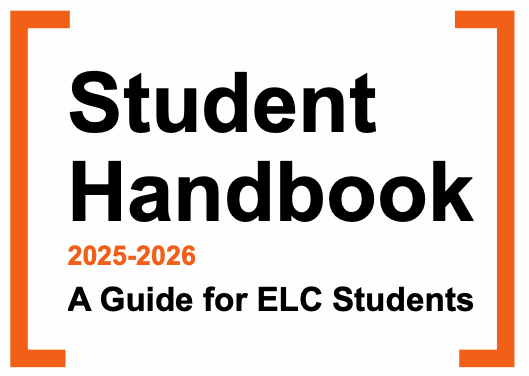Program Overview
- RIT/
- English Language Center/
- Program/
- Program Overview
The English Language Center has six levels of study. At all levels, you will focus on English for academic purposes to prepare you for university study.
Our core classes focus on the following:
Writing and Reading
Study of academic reading and writing
Speaking and Listening
Practicing presentations and lecture note-taking.
Language Analysis and Accuracy
Study of grammar form, use, and meaning
Interactions
Develop confidence and skill by interacting with students and professionals on the RIT campus
Course Overview
Small Class Sizes
With fewer than 20 students per class, our smaller class sizes offer a more personalized learning experience in an engaging classroom environment.
Learning by Doing
Our interactive classes allow students to receive direct personal feedback on language skills from experienced instructors with specialized degrees in language teaching and linguistics.
Six Levels of Study
A full program of English is offered at six levels from Basic English to Academic English. At all levels, we offer courses that practice skills in writing/reading, speaking/listening, and linguistic analysis.
English Language Center Levels
A full program of English is offered at six levels from Basic English to the top level, Academic English. At all levels, the English Language Center offers courses that practice skills in writing/reading, speaking/listening, and linguistic analysis. The English Language Center may at times need to combine levels or classes.
- Academic English
Students focus on style, flow, and control for a professional level of performance - Advanced
Students work on skills to produce complex, connected ideas on university-level topics with clear purpose and organization - High Intermediate
Students practice control of grammar and vocabulary to express and expand ideas in academic formats such as essays and presentations - Intermediate
Student practice language skills to complete short projects with clear expression and organization - Beginner
Students increase their ability to express and connect complete, multi-part ideas in writing and speaking - Basic
Students focus on core vocabulary and grammar and speaking skills
English Language Center Levels and International Test Scores
Your level placement at the English Language enter is determined based on your placement test scores.
Students who do not have international English exam scores can learn more about RIT’s English Language Exam or register for the test here.
| ELC Proficiency level | TOEFL score | IELTS score | DET score | CFER band |
|---|---|---|---|---|
| Academic English (Undergraduate track and Graduate track) |
70-100/4.0-6.0 | 6.5-7.0 | 115-140 | B2-C1 |
| Advanced | 60-69/4.0 | 6.0 | 105 | B2 (low) |
| High Intermediate | 46-59/3.5 | 5.5 | 90 | B1 |
| Intermediate | 32-45/3.0 | 5.0 | 80 | B1 (low) |
| Basic and Beginner | 0-31/1-2.5 | 0-4.5 | 65 | A1-A2 |
ELC also accepts LanguageCert and PTE scores. If you have these exam scores, please contact ELC for placement review.
Plan Your Study
New students can start ELC courses in the Fall, Spring or Summer. RIT Graduate and Undergraduate students may want to consider the option of completing English requirements in the spring or summer before your degree program begins.
SPRING 2025 DATES: January 10, 2025 – April 28, 2025
In-person Summer Semester
(Available to all students)
Enroll in a 4-week Summer Program to complete your English language requirements before your academic program begins in the fall semester.
Online Summer Semester
(Graduate Students Only)
Three online courses are offered across the summer to prepare student for graduate study and meet all RIT graduate program English requirements.
In-person Fall or Spring Semester
(Available to all students)
If you have been accepted to an RIT degree for a Fall or Spring start, begin your required English language courses at the start of the semester.
